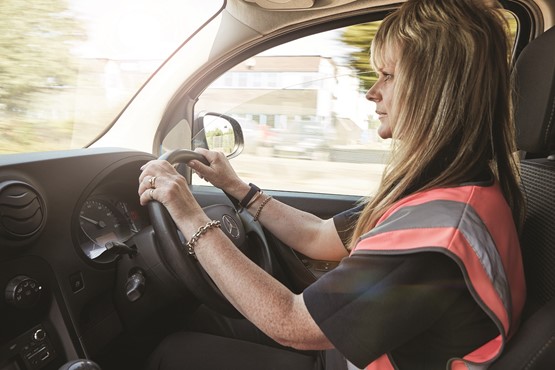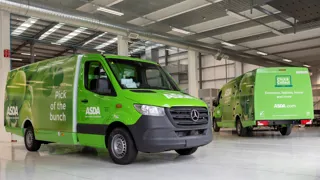An army of delivery drivers and tens of thousands of vans are preparing for what could be the first truly digital Christmas.
Analysts expect online sales to overtake spending in physical stores for the first time this year as the country prepares for a Covid Christmas.
Last year, £25.4 billion was spent online and £53.1bn in stores, but, this Christmas, research suggests the situation will be reversed.
In September, online sales grew by 53% year-on-year, according to the Office for National Statistics (ONS) and is expected to increase by 55% this month, with significant shopping events such as Black Friday and Cyber Monday (November 27 and 30 respectively), before lockdown is scheduled to end on December 2.
Based on forecasts by parcel delivery network ParcelHero of a similar overall spend to last Christmas, online shopping will rise to a record-breaking £39.4bn, while high street spend would fall to £39.1bn.
The situation is putting additional strain on courier and home delivery companies, with fleets having to recruit hundreds of temporary and part-time drivers in a bid to accommodate the increase in demand.
Emissions are also expected to surge due to the rise in the number of vans and trucks on the UK’s roads, and the increase in daily mileage, particularly in urban and residential areas.
The Dirty Delivery Report by price comparison site Money.co.uk suggests Black Friday alone could be responsible for 429,000 tonnes of emissions. However, the report fails to offset the predicted rise in truck and van emissions with the reduced emissions from fewer car journeys as people no longer travel to shopping centres to purchase goods.
David Savage, UK & Ireland managing director at software and data analytics provider Geotab, called on Government to double its efforts to make the switch to electric a viable option for commercial fleets with a focus on HGVs, vans and last-mile infrastructure.
“The pandemic has helped UK energy demand go green, and we want to see this continue. Geotab would like to see the Government focus on business fleet transitions to electric vehicles (EVs) to help the UK hit its climate objectives,” said Savage.
“We appreciate that transitions require a sizeable investment and decisions can’t be made lightly. Larger scale production of EVs will aid, but the business incentives and subsidies must be on a par. We need to see businesses and individuals working together to a common goal for the UK’s green transport transformation be truly realised.”
Home delivery recruitment drive
Yodel, which operates 530 vans and 300 trucks, some of which are electric, is ranked seventh most carbon-conscious delivery company in the Money.co.uk report. It has already taken steps to ensure it can cope with demand during the festive period, including a major recruitment drive.
Almost 3,000 additional staff are being recruited, including 2,500 self-employed and 450 employed roles.
Yodel CEO Mike Hancox told Commercial Fleet: “This year, we’ve been operating at peak levels since March, with volumes consistently up 20% month-on-month compared with 2019.
“For the upcoming peak season, we’re forecasting our volumes to increase by another 20%, making this the busiest Christmas for deliveries by some distance.”
The run up to Christmas has traditionally been Yodel’s busiest period, but Hancox said: “This year is set to be longer in duration and higher in intensity than ever before.
“With the new lockdown coming into effect we expect shoppers to turn to online shopping to send their gifts as they won’t be able to meet up with friends and family this holiday season.
“We’re also anticipating a surge in demand for fresh food and wine deliveries as consumers order Christmas dinner ingredients direct to the doorstep.”
Yodel’s half-year trading update showed an overall increase in sales and volume growth of 16% compared with quarter one of this financial year. Full-year revenue is projected to be between £500-520 million.
CitySprint – ranked eighth most carbon-conscious – announced last month that it was recruiting more than 750 additional couriers across the UK, ahead of this year’s Christmas rush.
Mark Footman, operations director at CitySprint, said: “The festive season is one of the most important times of the year for our clients, with delivery volumes increasing across our business.”
Footman says the firm is currently “ahead of target” on recruiting additional staff. He added: “We’re also looking to further diversify our fleet in the coming months to help support demand and ensure we are in the best possible position to deliver for all our customers.”
Darren Taylor, business solutions director at CitySprint, says Covid-19 has “completely rewritten” the shape of peak periods this year.
“While, undoubtedly, the Christmas peak will increase demand, we also suspect that the month-on-month trend will be less acute than previous years,” he said.
“However, with a second national lockdown in full swing, and retail stores forced to shut their doors ahead of peak, it’s inevitable that this will correlate with an even more significant shift to online.
“With Argos announcing that they will be shutting 400-plus stores and with more businesses set to do the same, there’s no doubt that this will compound the situation further, leading to an increase in demand for couriers and logistics support.”
"There's no doubt the problems of Christmas 2014 could be repeated this year," David Jinks Parcel Hero
Jonathan Smith, chief executive at APC Overnight, says that, while many industries have seen “considerable downturns” as a result of the pandemic, logistics continues to expand as demand grows.
“The increase in online ordering has meant that businesses have had to rely heavily on carriers to get these items delivered,” he said.
APC is predicting year-on-year growth of up to 20% and to meet that growing demand, First 4 Logistics, part of the APC network, opened a new operational parcel depot in Newhaven, last month.
The new depot has 17,000sq ft of warehouse space, an increase of 10,000sq ft compared with its previous site in Newhaven.
Meanwhile, DPD, third in the Money.co.uk carbon-conscious table behind only Royal Mail and Amazon, announced in the summer that it was recruiting 6,000 new staff, including 3,500 drivers, in response to an unprecedented boom in online shopping caused by Covid-19.
The delivery firm is investing £200m this year to expand its next-day parcel capacity, including £100m on vehicles, £60m on 15 new regional depots (10 more than originally planned in 2020) and the remainder on technology.
“We recruited 3,500 new drivers and 2,500 new full-time staff in depots, hubs and in management positions,” said Tim Jones, DPD director of marketing.
“Parcel volumes have been up by an average of more than 40% year-on-year since March and we are planning for a similar uplift during the Black Friday and Christmas period.”
Addison Lee, which operates a 4,500-strong fleet of vans, cars, motorbikes and bicycles, has also launched a new delivery service to help consumers navigate the lockdown and future coronavirus restrictions.
Immediately after the first lockdown in March, demand for Addison Lee’s courier services rose by 30% as businesses and people adapted to spending lots more time at home.
Its new service, AL Request, allows people to get access to everyday items, such as groceries and flowers, and even get a head start on their Christmas shopping, through a click-and-collect service.
It will be available across Addison Lee’s digital channels – app and web – and the functionality allows customers to add their unique order receipt number to the booking for proof of purchase and collection. The courier can then pick up the item on the customer’s behalf and deliver it straight to their home.
Supply chains stretched
The expected record-breaking online Christmas, however, risks overstretching supply chains, according to ParcelHero head of consumer research, David Jinks.
He explained: “The huge demand for deliveries is being compounded by the reported loss of a quarter of a million EU nationals from the UK economy this year, which will lead to a 30% shortfall in drivers and warehouse workers.
“Even though many retailers and delivery companies are attempting to hire thousands more staff in preparation for this year’s Christmas peak, this might be difficult to do in practice.”
Jinks believes retailers may need to radically shake up Christmas distribution plans. “Christmas success is always balanced on a knife edge,” he said. “It only took an increase in the popularity of online Black Friday shopping in 2014 to cause Christmas chaos across the retail and delivery industry.”
Nearly one-in-three online shoppers experienced problems with their orders that Christmas, 49% suffered from missed deliveries due to overstretched companies’ erratic delivery patterns, while 45% experienced late deliveries or never received their goods.
“There’s no doubt the problems of Christmas 2014 could be repeated this year if retailers underestimate the scale of the challenge,” he added.

Berry Recruitment, one of the largest temporary worker suppliers in the country, says demand for delivery drivers is running at 30% above supply.
It believes a combination of a huge increase in online ordering and fewer European workers has created a perfect storm. A view supported by findings from the business news service Quartz, which analysed data from the ONS and found around a quarter of a million people from the EU have left the UK economy since the start of the year, because of the impact of both Covid and Brexit.
While drivers are in demand, van makers are also reporting brisk business, as fleets recruit vehicles to take the strain.
Light commercial vehicle (LCV) registrations grew for the second consecutive month in October, up 13.3%, the highest October on record.
The figures, from the Society of Motor Manufacturers and Traders (SMMT), show 28,753 vans, pickups and 4x4s were registered in the month.
Demand was driven by the heavier end of the LCV market, with registrations for vans weighing more than 2.5 and up to 3.5 tonnes up 26.8% to 20,492 units.
A combination of pent up demand from the UK’s first lockdown and new fleet orders coming in ahead of an anticipated busy Christmas period kept van deliveries high in the month, says SMMT.
Growing demand in the new van market has also filtered down to the used market, where used prices have risen by 26% during 2020, according to Aston Barclay figures.
Average prices rose in Q3 by 4.2% (£255) to £6,204, a massive 26% price rise in 2020 from a Q1 average of £4,923 to £6,204 in Q3.
Commercial vehicle activity during lockdown
UK commercial vehicle activity is performing stronger during England’s second nationwide lockdown than the first, latest figures from the Geotab and Webfleet Solutions Commercial Mobility Recovery Dashboard reveal.
A comparison of the second week of lockdown, from November 9 to November 15, found activity levels to be 33% higher – averaging 85% of pre-Covid-19 levels – than readings from March 30 to April 5, the second week of the first lockdown, when activity plummeted to an average of 52%.
The latest data comes as the sector braces for the busiest retail period of the year, with Black Friday sales and festive purchases set to heighten demand.
Commercial vehicle activity in France is currently averaging 80%, Germany 102%, Italy 100%, and Spain 87%.
The Commercial Mobility Recovery Dashboard was produced by Geotab and Webfleet Solutions in a joint effort to measure the pulse of commercial fleet activity recovery.
The dashboard analyses aggregated and anonymised data from more than three million connected vehicles around the world to help visualise the impact of Covid-19 on commercial vehicle and trade activity and to support strategic recovery efforts.
It outlines week-to-week activity on a country-by-country basis, as well as by three sub-sectors – business services, construction and freight.
Business services have once again been hit hardest, down to 60% in the second week of the current lockdown. This, however, signals a 15% increase on the same week of the first lockdown, when it stood at 45%.
UK freight activity – consisting of essential services and necessary goods, such as food, medicine and post – remains strong at 100%, which compares to 71% over the same time period.
Fleets within the construction industry have also coped well, averaging 92% in the second week of the first lockdown, compared to 44% in the corresponding week in the first lockdown.
David Savage, regional manager UK & Ireland for Geotab, said: “The UK certainly faces tough challenges with another nationwide lockdown as we enter the busiest time of the year.
“These numbers, however, paint a positive picture of how fleets have learned to cope better with tighter measures over the last eight months.
“More than ever, fleet managers will be looking to squeeze efficiencies in their operations, reducing vehicle idle time and fuel consumption while improving productivity, routing and load sizes.
"A good understanding of fleet data will remain central to all operations’ best practice in this busy period.”
Beverley Wise, sales director UK & Ireland for Webfleet Solutions, added: “The commercial transport sector is always under immense pressure at this time of year, as the sector grapples with a sharp uplift in online retail sales.
"With the tightening of the coronavirus restrictions, this pressure is even more acute.
“The latest data from our dashboard is encouraging and demonstrates how commercial fleets are successfully navigating this ongoing period of adversity and evolving their operations to suit the new landscape.
“Though we do not know what the future holds, it is clear that the fleets who adapt their processes and use data-driven insights to fully optimise workflow and drive efficiencies will be better equipped to not only deliver on surge demands, but to thrive in the post-pandemic era.”
Is growth in home delivery sustainable? Read more from Parcel Hero's David Jinks here.























Login to comment
Comments
No comments have been made yet.